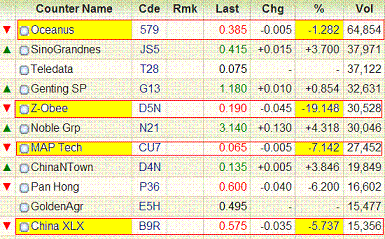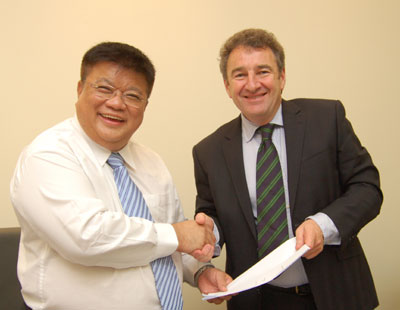
Oceanus TDR’S valuation is unlikely to be dampened as a result of the Singapore market’s conservative valuation compared to Taiwan, according to Polaris Securities’ Huang Chi-Yuan.
Mr Huang heads Greater China investment banking at Polaris Financial Group, and spoke from Taiwan to NextInsight this week in an exclusive interview via long distance call when he aired his views about the outlook of TDR prices.
TAIEX, which is Taiwan’s capitalization-weighted index of all listed common stocks trading on the Taiwan Stock Exchange has a price earnings of about 200, compared to about 30 for the FT ST All-shares index.
The reason for its richer valuations is that retail investors in Taiwan are very sophisticated, very open-minded and highly attuned to international developments, resulting in strong liquidity in the stock market there, according to Mr Huang.
Polaris is Oceanus’ appointed issue advisor and lead underwriter for its TDRs that are expected to commence trades on 31 Dec.
The book builders decided yesterday that the 200 million Oceanus TDRs will be issued at NT$9.50 (41.5 cts) each, amounting to a float of S$83 million.
Polaris typically manages TDR deal sizes valued between US$20 million to US$40 million (S$28 million to S$56 million).
The non fungible nature of TDRs mean that Oceanus will be traded like a small cap stock in Taiwan, said Mr Huang, even though the integrated abalone player has in reality a market cap of over S$700 million on the Singapore bourse.
As the Taiwanese stock market is dominated by small to medium-sized companies, its investors are more receptive to TDR listings, said Mr Huang.
Richer valuations by Taiwan investors mean that investors can expect TDRs to stay above their issue prices, as brokers often refer to prices transacted on the primary exchange when book building.
A random sampling of 6 TDRs issued this year show TDRs have stayed above water so far (see table below).
|
||||||||||||||||||||||||||||||||||||
Mr Huang expects Oceanus TDRs to perform well, as Taiwanese investors like China-concept plays, especially those that benefit from China’s consumption growth.
Investors were very excited by Oceanus’ integrated business model encompassing agriculture, food processing to retail (restaurant chain), after the phenomenal showing by Want Want, which was the first TDR listing this year.
Small floats tend to show more upside due to the relative scarcity of TDRs available, said Mr Huang.
Like Want Want's crackers, Tingyi's Master Kong instant noodles also dominate China's convenience food scene, but the later's TDRs are trading at close to issue price.
The difference is Want Want raised S$140 million, while Tingyi raised 5 times the amount.
Taiwan investors were also won over by the abalone farmer’s eloquent and charismatic chairman, Dr Ng Cher Yew, said Mr Huang.
To them, 10 times PE for a profitable stock like Oceanus with high growth potential is very cheap, compared to Tingyi which trades at 37 times.
Why do Taiwan investors to prefer TDRs over the cheaper underlying shares on a foreign exchange?
First, opportunities arise when there is high demand for a company's TDRs versus its small float.
Second, it is more convenient to trade on one’s local exchange.
Third, research is availabe in a local language, and
Finally, there is no exchange rate risk.
Difference between depositary receipt and primary listing

Prices of Singapore stocks with overseas listing plans took a beating on Wed on top volume after all approvals of dual listing on the Hong Kong Stock Exchange were suspended due to concerns by regulators over recent price hikes of the shares listed by introduction.
Z-Obee, which had recently received approval for its dual listing on HKSE, was sold down 19%.
In contrast, the chairman of Taiwan’s top financial regulator, Financial Supervisory Commission (FSC), Sean Chen, had earlier this month shrugged off press speculation that TDR prices had been artificially jacked up.
The difference between a depositary receipt and a dual primary listing is that the later comes with more stringent listing and disclosure requirements, as the exchange takes upon itself the fiduciary role of the primary regulator.
A second difference is only a small portion of a company’s issued capital are maintained with a custodian institution for depositary receipts.
For dual listing however, a shareholder who holds part of the float on the primary exchange may trade on the second exchange by transferring his share membership from the Bermuda register (for Singapore shares) to the branch register of members in Hong Kong. Share transfer between the registers takes about 2 weeks.
| S'pore listco with second listing intention | Overseas listing announcement |
Platform | Stock price at announcement |
Last close stock price |
Price change |
| CHANGTIAN | 16-Oct-09 | TDR in Taiwan | 0.210 | 0.190 | -10% |
| CHINA TAISAN | 13-Oct-09 | ADR | 0.225 | 0.175 | -22% |
| CHINA XLX FERTILIZER* | 28-Jul-09 | Dual listing in HK |
0.54 | 0.585 | 8% |
| MAP TECH | 7-Dec-09 | TDR on GreTai | 0.06 | 0.065 | 8% |
| MIDAS | 22-Sep-09 | Secondary listing in HK | 0.895 | 0.875 | -2% |
| OCEANUS | 27-Oct-09 | TDR in Taiwan | 0.365 | 0.385 | 5% |
| Z-OBEE | 28-Sep-09 | Dual listing in HK |
0.145 | 0.190 | 31% |
Compiled by NextInsight on 23 Dec 2009
* China XLX has already achieved a dual listing recently
The good news is: Investors can look forward to a spate of TDRs from Singapore next year.
Mr Huang reveals that he has received a fair number of enquiries from Singapore as the relative ease of raising money via TDRs has generated much interest from companies looking for cash.
As long as a company has been profitable in the year prior to its proposed TDR listing, has a pretax margin of at least 6%, funds can be raised within 3 months of appointing an issue manager.
Related story: OCEANUS: TDRs to debut at up to 35% premium on Thurs





